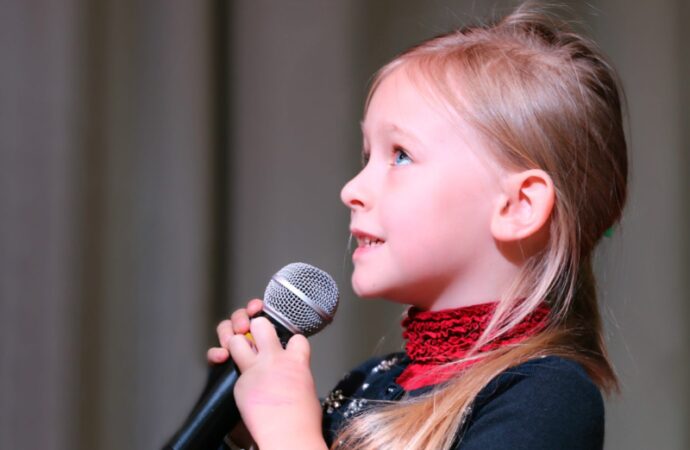By now you may have seen the video of a children’s choir singing the national anthem in the U.S. Capitol rotunda. The children are seemingly well-trained, and their training is made ever more beautiful by the acoustics of their surroundings.
What’s unique about this video, however, is not their singing, but the fact that the capitol police abruptly stopped them. As you can see in the video below, a small group in the background whispers intensely while the children sing, then begin to disperse, but the female officer taps another official and motions for him to go stop the singing.
Accounts differ as to what happened. The choir director says his group had permission from several different officials, and that they were abruptly stopped because the female police officer said they were conducting a “demonstration.”
The statement from the police, however, said that it was “wrongfully claimed we stopped the performance because it ‘might offend someone,’” going on to say that they didn’t stop the performance but allowed the children to continue singing.
Given the video evidence, it’s a bit difficult to believe at least the latter part of that statement. I’ll let others quibble about that issue, however, because I want to focus on another aspect of this story.
I find it interesting that these children were stopped from completing what is traditionally the last verse of The Star-Spangled Banner. It’s a verse not often heard, but one that contains some true fightin’ words—at least, they sure seem that way in the culture we live in today:
O thus be it ever when freemen shall stand
Between their lov’d home and the war’s desolation!
Blest with vict’ry and peace may the heav’n rescued land
Praise the power that hath made and preserv’d us a nation!
Then conquer we must, when our cause it is just,
And this be our motto – “In God is our trust,”
And the star-spangled banner in triumph shall wave
O’er the land of the free and the home of the brave.
In essence, these words depict the struggle for freedom. They suggest that there has been a hard fight, and that the outcome of that fight by brave men brought a positive reward: victory and peace.
It also shows that this struggle was not won solely by the might, strength, or ingenuity of the people. It was won by God. Those who sing it are acknowledging that they are a heaven-rescued people, preserved by the power of God, who is good to those who wait for Him and seek Him.
So yes, it’s easy to see how those who do not want to acknowledge God’s hand in the founding and preservation of our country, who do not want to promote honor, bravery, and a struggle against tyranny, who do not want us to have the hope of a peaceful home may not like these words and want to silence them.
But there’s another possible reason this singing wasn’t appreciated in the nation’s capitol, and that is simply the fact that it was singing.
You see, singing does something to positive to our bodies. According to an opera organization in the UK, singing lifts our spirits because of the “happy chemicals” it releases, such as dopamine. It also reduces stress, improves our mental abilities, boosts our confidence, and builds community.
That list can tell you all you need to know about why singing in the capitol might be considered an unworthy “demonstration” by American society today. Those who seem to want to remake America into a new progressive or socialist utopia want us to be stressed about all the problems around us. They want us to forget the principles America was founded on and the things that made this nation great. They want us to be discouraged and cower, too sheepish or scared to speak out at the wrongs we see. And they want us to think that we’re all alone, that we’re the only ones left who still believe the traditions and principles of our forefathers are worth fighting for.
But singing does something else that terrifies those who seem intent upon tearing down our culture: it speaks truth to our hearts.
The old songs and hymns, a prime of example of which is The Star-Spangled Banner, often have a far greater depth of meaning and connection than many of the mindless repetitive dittys we hear today. Perhaps this is because those who wrote those pieces seemed to have a greater breadth of knowledge and understanding—a cultural literacy, if you will—that came from drawing on their knowledge of history, religion and theology, and even classic literature. This cultural literacy enabled them to connect the dots, perceiving truth and rejecting the lies, which was then infused into their music and poetry.
Those truths get passed along to us and become embedded in our hearts when we sing these old songs. And in an era where truth is relative and fluid, such songs can be downright dangerous.
That fact alone inspires me to sing these songs all the more. And I’ve done so the last few days as I’ve been mulling over this idea—in the garden, for example, or while lying in bed trying to fall asleep—and it’s amazing how the practice fills the heart with peace, joy, and solid truth.
So why not try learning a few of these old songs so you readily have truth to speak (and sing) to your heart? Start with the other verses of the Star-Spangled Banner, or some good old hymn classics that have become a part of Americana, such as When I Can Read My Title Clear or Amazing Grace. Doing so gives you a ready battle cry filled with strength and truth for the long fight ahead.
—
Originally published at Annie’s Substack.
Image credit: PxFuel
















Leave a Comment
Your email address will not be published. Required fields are marked with *